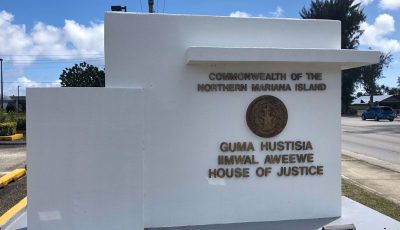‘Disciplinary case vs Banes must be remanded to Chief Justice’
Superior Court Associate Judge Joseph N. Camacho has ruled that the disciplinary case against attorney David G. Banes must be remanded to the proper authority, the Chief Justice of the CNMI Supreme Court.
Camacho granted Banes’ motion to strike the disciplinary complaint. The judge ruled that since the complaint has been stricken, the lawyer’s motion to approve settlement and other motions are moot.
Camacho determined that since no prosecuting counsel has been formally appointed by Chief Justice Alexandro Castro pursuant to the new disciplinary rules, this matter is improperly heard before the Superior Court.
Camacho noted that although a complaint was filed, it was filed by a disciplinary counsel appointed by Superior Court Presiding Judge Robert C. Naraja pursuant to the old disciplinary rules.
Atty. Mitchell Thompson, who chairs the Guam Bar Association Ethics Committee, filed the disciplinary complaint against Banes for violating a provision of the ABA Model Rules of Professional Conduct when he allegedly revealed information learned in discussions with a prospective client.
Amjad Farhoud filed the complaint with the Disciplinary Committee of the CNMI Bar Association in August 2011.
The court appointed Thompson to prosecute the matter.
In response to the complaint, Banes, through counsel Robert O’Connor, has denied the allegations and asked the court to dismiss/strike the complaint and rule that he did not violate any ethical rule.
At the Nov. 10, 2015, hearing, attorneys Joseph E. Horey and Mark Scoggins served as counsel for Banes. Thompson appeared telephonically.
According to court records, Banes and Thompson were negotiating a settlement under the old disciplinary rules in January 2015.
Thompson stated that he forwarded a copy of a proposed settlement to attorney Timothy Bellas, the chair of the CNMI Bar Disciplinary Committee, on Feb. 13, 2015.
Camacho said if a settlement did exist, it was never acted upon by the Disciplinary Committee.
Thompson filed the complaint on June 2, 2015, as is required under the new disciplinary rules.
In support of Banes’ argument to strike, respondent argued that the new disciplinary rules were not constitutionally adopted by the CNMI Legislature.
Banes argued that the new disciplinary rules do not apply in this case, since the parties had reached a settlement before the new disciplinary rules took effect.
Banes also argued that, should the court find that there was no settlement reached prior to the new disciplinary rules taking effect, that the new disciplinary rules only apply prospectively, rather than retroactively.
Banes argued that the new disciplinary rules were not followed since no prosecuting counsel was appointed as is required under the new disciplinary rules, and that the complaint was untimely filed.
Thompson did not respond to all of the grounds argued by Banes. He specifically argued that Banes’ claims that the disciplinary counsel had not been properly appointed under the new disciplinary rules, and that the complaint is untimely were without merit.
In granting Banes’ motion to strike, Camacho ruled that this case was not settled prior to the enactment of the new disciplinary rules that took effect on Feb. 14, 2015.
Camacho said the disciplinary counsel may not unilaterally settle a matter without conferring with the disciplinary committee, and this has not occurred, regardless of whether or not Banes and Thompson had allegedly reached an agreement.
The judge pointed out that there was no settlement in this case.
Camacho also ruled that the new disciplinary rules apply to pending cases unless their application would not be feasible or would work an injustice.
Camacho said under the old disciplinary rules, the Superior Court presiding judge would appoint the disciplinary counsel.
The new disciplinary rules, on the other hand, require that a prosecuting counsel by appointed by the CNMI Supreme Court Chief Justice.
Camacho said in the time since the new disciplinary rules took effect, no prosecuting counsel has been appointed by the Chief Justice pursuant to the new disciplinary rules.



























